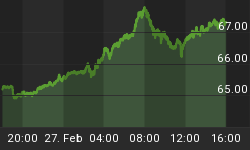The yuan, China's currency (also known as the renminbi), has been kept pegged to the dollar at about 8.28 since 1994. Several key players in the global economy including members of the Bush administration and as well as the Federal Reserve have encouraged China to loosen its currency peg to the US dollar.
One main motivation for China to allow its currency to appreciate against the dollar would be to allow for a correction in the US current account imbalance, which was estimated at $162 billion in 2004. One of the main topics of conversation at the G7 meeting that took place in Washington in mid-April was China's loosening of its currency from the greenback. China declined an invitation. Nevertheless, comments from China's government suggest they are on their way to reshaping their currency strategy.
If China proceeds with the process, a bonus to neighboring Asian countries is that their currencies will probably rise in value against the dollar consequent to the yuan's revaluation. China may also benefit by reducing its high bill for oil imports, thereby helping keep their economy in shape. High oil prices are usually a burden on consumers. In addition, making its currency more flexible may help reduce potential antagonism from Congress in the form of trade barriers between the US and China.
It's been noted that the dollar has been traded for the yen recently in hopes of cashing in on a rise in the yen subsequent to a Chinese yuan revaluation, but could this simply lead to a further collapse for the greenback? In the short-term, this may be the case as traders rush to sell dollars in exchange for yen in hopes of making a profit. However, subsequent to the yen shooting up in value, currency traders may purchase back their dollars.
As to when China will decide to loosen its renminbi peg on the greenback is still uncertain, however, central bank governors of Japan, China, and South Korea plan to meet at their first international conference on May 27. Such a date may serve as a general guideline around which China may end up changing its currency situation, since it may be best to coordinate a currency revaluation with other neighboring countries. Indeed, some analysts have noted that the Japanese currency may be undervalued as well and could be up for revaluation.
Whether China decides to make changes to its currency strategy, now or later, such changes are sure to unleash a cascade of exchange rate adjustments throughout Asia. In addition, several parties are bound to reap rewards from the revaluation of the Chinese currency. Hopefully the US will be among those who will benefit.















